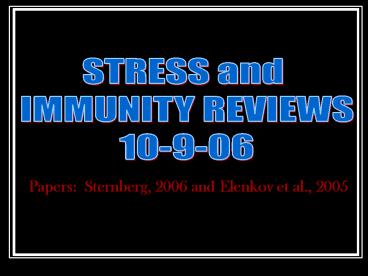Introduction to The Concept of Stress - PowerPoint PPT Presentation
1 / 16
Title:
Introduction to The Concept of Stress
Description:
HPA-MEDIATED IMMUNITY - Glucocorticoids major role. Important physiological mediator ... SNS CONTROL of IMMUNITY. Regional level -- innervation of immune ... – PowerPoint PPT presentation
Number of Views:52
Avg rating:3.0/5.0
Title: Introduction to The Concept of Stress
1
STRESS and IMMUNITY REVIEWS 10-9-06
Papers Sternberg, 2006 and Elenkov et al., 2005
2
GENERAL PRINCIPLES
- Bi-directional communication between CNS and
Immune System (IS) - Cytokines signal brain responds
- Brain signals immune system responds
- Receptors on immune cells -- neurotransmitters,
neuropeptides, neurohormones - Neural factors immune-cell maturation
3
GENERAL PRINCIPLES
- CNS-IS immediate nonspecific host defense
- CNS rapidly responds
- CNS activate same secondary signaling pathway
- G-protein-coupled receptors
- IS mediators interact w/ neurotransmitters
- IS mediators modulate neural pathways
- Neuropeptides (CNS) trigger pro-inflammatory
mediators
4
BI-DIRECTIONAL COMMUNICATION
- Homeostasis of the IS
- Cytokine-dependent
- Chemical messengers
- Cytokines autocrine, paracrine, endocrine
- Proliferation
- Differentiation
- Activity
5
CNS REGULATION of IMMUNITY
- Systemic, regional, local sites
- Peripheral NS first line at local sites of
inflammation - Neuropeptides increase responses
- SNS PNS inhibit at regional level
- Innervation of immune organs
6
CNS REGULATION of IMMUNITY
- Neuroendocrine responses at systemic level
- HPA anti-inflammatory
- HPG sex hormones
- HPT thyroid hormone
7
CYTOKINES and IMMUNITY
- Mediate and control immune and inflammatory
responses - Common diseases disruption in cytokine balance
specifically, Th1 and Th2 cytokines - anti- vs. pro-
- Th2 shift protects overshooting w/ Th1 cytokines
8
HPA-MEDIATED IMMUNITY
- Feed-back loop for inflammation
- Blunted HPA
- Autoimmune Diseases
- Inflammatory Diseases
- Excess HPA activity chronic stress
- Increase susceptibility to viruses
- Prolong wound healing
- Reduced vaccine efficacy
9
HPA-MEDIATED IMMUNITY - Glucocorticoids major role
- Important physiological mediator
- Inflammation anti-inflammatory
- Inflammation- and glucocorticoid-resistant
death - Balance immune homeostasis
- Regulate immune-cell function
- Shift adaptive responses
- Th1 to Th2 via inhibition of IL-12
- Enhance DTH
10
HPA-MEDIATED IMMUNITY - Glucocorticoids major role
- Affects innate immune-cell function
- Suppresses maturation, differentiation,
proliferation - Inhibit cytokine chemokine secretion
- Inhibit receptor expression (adhesion molecules
chemokine receptors) - Regulate innate responses (infection bacterial
and viral)
11
BALANCE of GLUCORTICOIDS REQUIRED for IMMUNE
HOMEOSTASIS
12
SNS CONTROL of IMMUNITY
- Regional level -- innervation of immune organs,
release norepinephrine - Pathogen activates innate inflammatory response
- Innate cytokine released
- Stimulate SNS to release norepinephrine and
others - Inhibits NK macrophage cytokine production
- Negative feedback inhibition dampens
inflammatory response - Restores homeostasis
13
SNS CONTROL of IMMUNITY
- Increase immune and pro-inflammatory responses
- Norepinephrine inhibitory effects (mostly)
- NPY regional regulation and systemic w/
epinephrine - Majority systemic effects are anti-inflammatory,
some increase inflammation
14
PSN CONTROL of IMMUNITY
- Modulate inflammation via vagus nerve, regional
level - Signals to brain via IL-1 receptor (afferent)
- Acetylcholine release and negative-feedback
(efferent) - Neurotransmitter is acetylcholine
- Mostly dampens inflammatory responses
15
Peripheral NS CONTROL of IMMUNITY
- Local regulation via neuropeptides
- CRH, Substance P (SP), calcitonin gene-related
peptide (CGRP) regulate inflammation - Expressed at sites
- Pro-inflammatory
- Favor pathogen clearance
- Others Opioids, VIP, a-MSH
16
SCHEMATIC of INTERACTIONS BTWN NEUROPEPTIDES and
CYTOKINES Local Responses
Elenkov et at., 2005 Neuroimmunomodulation
12255-269































